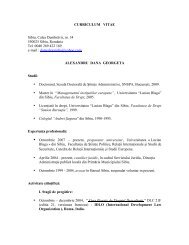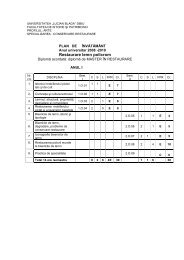Download - Facultatea de Științe Socio-Umane - Universitatea ...
Download - Facultatea de Științe Socio-Umane - Universitatea ...
Download - Facultatea de Științe Socio-Umane - Universitatea ...
You also want an ePaper? Increase the reach of your titles
YUMPU automatically turns print PDFs into web optimized ePapers that Google loves.
Weapons and Military Equipment Found in the German Settlement Area<br />
from Southern Transylvania (the 12 th – 13 th Centuries).<br />
Some Aspects and Perspectives *<br />
Maria Emilia Crîngaci ŢIPLIC **<br />
Keywords: sword, tripod vessel, mace, German Hospites, Transylvania,<br />
blacksmith’s workshop from Şelimbăr (Schellenberg), end of 12 th Century, 13 th<br />
Century.<br />
Abstract<br />
Based on the current state of research and through the study of materials resulted<br />
from excavations or coinci<strong>de</strong>ntal discoveries, we have attempted to reconstruct daily<br />
life aspects of the German Hospites’ communities from the South of Transylvania in the<br />
12 th and the 13 th centuries from the perspective of material culture 1 . In or<strong>de</strong>r to<br />
properly achieve such a complex task, in addition to a multidisciplinary approach 2 , it is<br />
necessary to perform a thorough and <strong>de</strong>tailed analysis of the artefacts and the context<br />
of their discovery. The approach to this topic has encountered difficulties, especially<br />
due to the small number of systematic archaeological researches regarding the<br />
German colonization in southern Transylvania in the 12 th and the 13 th centuries 3 . Most<br />
components inclu<strong>de</strong>d in the catalogue come more from fortuitous findings and are less<br />
the result of archaeological research.<br />
The i<strong>de</strong>a of „cultural homogeneity” has been generally accepted starting with the<br />
12 th century, a fact that has lead to the archaeological material losing its ethnic<br />
* This work was possible with the financial support of the Operational Sector Programme for Human<br />
Resources Development 2007-2013, co-financed by the European Social Fund, un<strong>de</strong>r the project<br />
number POSDRU 89/1.5/S/61104.<br />
** The Romanian Aca<strong>de</strong>my, Institutul <strong>de</strong> Cercetări <strong>Socio</strong>-<strong>Umane</strong>, Sibiu, Bdul. Victoriei nr. 40; The<br />
Romanian Aca<strong>de</strong>my, The Centre for Transylvanian Studies, Cluj-Napoca, Str.<br />
(cringaci27@yahoo.com).<br />
1 This survey continues the one published in 2005 regarding the material culture of Transylvanian<br />
Saxons (the 12th – 13th centuries): liturgical objects (see M. E. Crîngaci Ţiplic 2005, p. 245-264.)<br />
2 We refer here to several interdisciplinary methods, such as metallographic, <strong>de</strong>ndro-chronologic,<br />
botanical and pedagogical analyses, anthropological surveys etc.<br />
3 We should in fact mention that, unfortunately, the archaeology of settlements dating from the German<br />
colonization period was less brought to attention as compared to other periods or areas from<br />
Transylvania, for example, the settlements from the 12 th century at Moreşti (K. Horedt 1984),<br />
Sighişoara – Dealul Viilor (R. Harhoiu, Gh. Baltag 2006-2007) and Bratei (A. Ioniţă 2009). The only<br />
archaeological research on medieval Transylvanian Saxon villages were those in Androhel (a village<br />
near Alţâna, later disappeared), but there we <strong>de</strong>alt with a 14th – 15th century settlement, which had<br />
long passed the first stages of colonization, and in Alba Ecclesia (Weisskirch), a disappeared settlement<br />
north of Miercurea Sibiului; the results of these excavations performed more than three <strong>de</strong>ca<strong>de</strong>s ago<br />
have never been published.<br />
Studia Universitas Cibiniensis, Series Historica, Supplementum No. 1, p. 73-104





